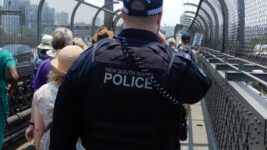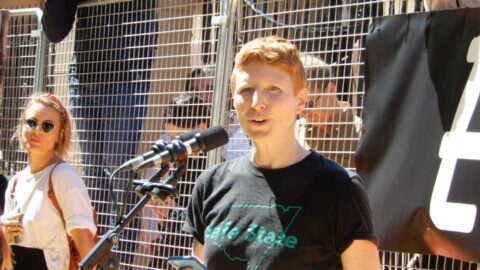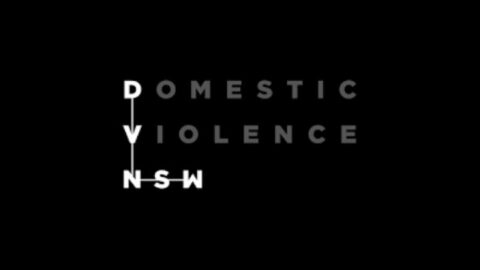NSW Police Needs Greater Transparency Around Domestic Violence, Says DVNSW’s Renata Field

Currently, there are at least six senior police officers, who’ve recently been found guilty of serious domestic violence offences, yet they’re continuing to serve on the NSW Police Force.
Indeed, over 2018-21, 56 officers were charged with domestic violence offences and so far, 15 have been found guilty.
The ABC revealed this data, which it obtained via freedom of information, a fortnight ago. And it does seem to reflect a long-held attitude that NSW police doesn’t tend to take domestic and family violence (DFV) crimes as seriously as other offences.
But the recent appointment of the force’s first female police commissioner, Karen Webb, may bode well for improving police approaches to domestic violence. She told the national broadcaster she has “zero tolerance” for DFV. And local police have been changing policy in this regard over recent years.
Auditing the force
The NSW Audit Office released its Police Responses to Domestic and Family Violence report on 4 April. It found the force has doubled its DV specialist workforce over the last half decade and has been focusing on the approach frontline officers are taking when attending to DFV incidents.
The auditor general found that NSW police deals with 140,000 DV calls a year – one every four minutes – while in terms of speciality officers dealing with domestic violence, it now has 280. And the auditor recommends the establishment of a standalone domestic and family violence command.
The report further indicates that there are issues with DFV perpetrators working within the NSW Police Force, as between January 2017 and April 2021, 166 domestic violence complaints were made against officers, and a quarter of these were sustained.
Protecting their own
NSW police has long been notorious for operating under a culture of toxic masculinity, as well as an understanding that officers protect their own. So, it’s easy to conceive that an attitude of turning the other way when a colleague perpetrates domestic violence may carry over into other circumstances.
DVNSW released its Policing of Domestic and Family Violence in NSW report this month as well. It raised significant questions around whether domestic violence offenders who are police officers are dealt with in as serious a manner as civilian offenders, especially around the pressing of charges.
The report also called for greater transparency around the way police handle DFV matters, and it recommends that NSW police Domestic Violence Standard Operating Procedures and Sexual Violence Standard Operating Procedures are released publicly as in other Australian jurisdictions.
DVNSW (Domestic Violence NSW) is the peak body representing DFV specialist services in this state, which operates from “a feminist, social justice perspective” that recognises “that domestic and family violence is serious, prevalent and driven by gender inequality”.
Sydney Criminal Lawyers spoke to DVNSW policy, advocacy, and research manager Renata Field about the prevalence of DFV offenders in the force, the issue of misidentifying the offender when police attend such incidents, and the improvements that NSW police have already been making.

It’s recently come to light that at least six senior NSW police officers found guilty of serious domestic violence offences are still serving on the force, while over a 52 month period ending in April last year, 166 DV complaints were made against officers, a quarter of which were sustained.
Renata, what do you think this says about attitudes towards domestic violence crimes in the NSW Police Force, and the message it sends to the broader community?
It’s really concerning to us. But we are really pleased to see that new commissioner Webb is acknowledging the problem and speaking out about weeding out toxic culture.
We’ve had quite a positive relationship with NSW police, and I know many of our members actually do as well. I believe, NSW police is taking the issue seriously, and is trying to improve the culture so that victims can feel as safe as possible coming forward.
But I really think that there are significant issues in the force. And, unfortunately, we don’t have the policies and procedures in place that we do in other jurisdictions, like Victoria, to address the perpetration of domestic violence within the police force.
There has been research released, which shows that the prevalence of domestic violence offenders is slightly higher within the police force. This research was done internationally. We haven’t done it in Australia.
But certainly, as in any workforce, you’re going to have people who are victims and people who are perpetrators, and there needs to be systems involved to make sure that people feel safe to report.
Working for DVNSW you must hear a lot of on the ground accounts from victim-survivors about their experiences with NSW police officers attending incidents.
What overall assessment would you give based on what you hear? And have things improved from what used to be a very bad reputation NSW police had in this regard?
In some ways it’s getting better. I don’t want to dissuade anybody from contacting police when they’re in significant harm or someone that they know is.
The police are the best we have and we’re working with them to improve that service.
There is still a long way to go though. The specialist services that we work with are helping police and working alongside them to make it a trauma-informed, violence-informed and gender-informed service. But certainly, there are a lot of issues.
One thing that we’re hopeful to get some funding for this year is for a pilot between specialist services and police, so that they can respond to issues alongside each other.
We’ve seen that working really well in other areas, and we think that funding pilots like that can give us really good chances of success and can make sure that people do have confidence in reporting and having their issues listened to.
Another concern that was raised in the auditor general’s report, which we’ve also heard from our members, is that there’s a lack of consistency in the policing.
People should have a similar level of response and trust in this taxpayer-funded service, whether they’re in Walgett or whether they’re in Woolloomooloo. People should have high quality support wherever they are.
The report from state auditor general Margaret Crawford found that NSW police has doubled its DV specialist workforce over the last half decade, which has enabled greater risk monitoring and support for frontline police.
From the perspective of DVNSW, how do you consider this rising focus on having police officers that specialise in domestic violence matters?
Generally, our membership supports specialisation of police. We don’t always see the best response from general duties police. But the membership has had very positive interactions with domestic violence liaison officers across NSW.
In the auditor general’s report, they support the creation of a domestic and family violence specialist command, which we’re also in full support of.
There are certainly some challenges with some communities calling for the full defunding of police.
But we want to ensure that no matter where people are that they can be safe, and that response in NSW involves police. So, we need to make sure that they’re available on the ground
Certainly, the police force in NSW has had a lot of challenges over the last two years with COVID, and we’ve seen specialist DV police officers redeployed sometimes to deal with COVID.
We hope that that’s something we don’t see as much into the future, so that those specialist domestic violence workers are available to deal with this particular type of crime category.
So, if a domestic violence situation arises, and frontline police respond, do specialist DV officers then turn up on the scene as well, or do they come into play later? How do specialist officers operate?
Generally, they aren’t always there on the ground, but they might be. They’re certainly much more involved when it comes to court, charging and making sure that there are compliance checks dealing with breaches of protection orders.
These specialist officers also provide advice to services who are working alongside police. So, they do a lot of stakeholder engagement.
In NSW, we’ve also got Safety Action Meetings, which are multidisciplinary meetings to support people who are at significant risk of harm and the specialist domestic violence liaison officers are the ones who host those meetings.
DVNSW released its own report alongside the auditor general’s, in which it identified a lack of transparency around operating procedures, as well as inconsistencies when officers are being accused of perpetrating such crimes.
Can you elaborate on the DVNSW findings? And what sort of implications do they have for people in the community who find themselves in violent domestic situations?
One of the recommendations from our report was for the police operating procedures around domestic violence and sexual assault to become public, and that’s something that’s not currently the case in NSW.
It’s our view that if they were public, there would be more transparency and accountability for frontline workers in the DV space.
But it’s also for people who experience domestic violence, so they understand what service they should be receiving, and what the general ways of practising are as mandated by those operating procedures.
There have been some concerns raised from police that if they were made public that people who use violence would also have access to them. But operating procedures are public in other jurisdictions and that hasn’t been an issue.
So, we’re working with NSW police around that concern. What we really want to see is that people who are experiencing violence have access to the information, so they know if they’re getting the best outcomes and that they’re getting the service they deserve.
This is one thing we have suggested that might make this process more transparent. It’s not a finding that was within the Audit Office report. That report looks at other options for transparency and accountability.
There are particular issues that arise in relation to domestic violence when it comes to policing it within First Nations communities.
I’ve spoken to Aboriginal women who’ve explained that often contacting police over such an incident, can result in the woman who is the victim being taken into custody.
Can you talk on this point?
One concern that we have with the policing of domestic violence is the misidentification of the primary aggressor.
Unfortunately, there are many situations where people are attending an event and they’re not doing what we would consider an accurate risk assessment of who was the most violent person, or the person who needs most protection.
Often when this risk assessment is done by other specialists, especially family violence specialists, they might come up with a different outcome.
Certainly, this issue is concerning and nuanced. There are situations where multiple people are hurting one another, and distinctions must be made of one person being the most in need of protection and one being the most aggressive.
However, in these situations, there is one person who is more fearful and in need of more protection and there are risk assessments that can be done to establish this.
We’re concerned that the misidentification issue is rife in NSW policing, and it’s something that really needs to be addressed by training.
It is a particular issue when it comes to First Nations communities. Aboriginal women I have spoken to have raised this misidentification issue quite a lot.
I am not Aboriginal myself, and I certainly would defer to the knowledge and expertise of Aboriginal communities around this issue.
In terms of how people who are victims can be taken into custody when they’ve contacted police, it’s not common but it does happen occasionally.
In other jurisdictions, for example, in the situation with Ms Dhu in Western Australia, who later died in custody, she was taken in for other offences.
Also, if there are warrants out on people or the police attending an incident and the person who’s in most need of protection is perhaps defending themselves using violence, those can be reasons that a person may be taken into custody.
Luckily, we don’t have the legislation that they have in Western Australia, which sees people taken into custody for things like traffic offences unrelated to the current crime.
But certainly, there are other reasons, such as people not attending court and then a warrant might be out on them, and even though they’re the victim, they end up in custody despite having called police for their own safety.
There is no one way that this works, but there are a few loopholes that can mean that the person who is most in need of protection is the one who ends up in custody.
But clearly, it’s about ensuring that the risk assessment process and the training police undergo is of a really high standard to make sure that we’re identifying the person that really needs our support and protection.
And lastly, Renata, the attitude of NSW police towards domestic violence has long been an issue.
But would you say it’s symptomatic of a greater problem in our society? And while these issues have long been debated, what are some of the key steps you consider could start bringing about substantial change?
Absolutely, domestic and family violence is a whole-of-society issue. And the positive thing about that is it’s preventable. So, if we all work together, we can create substantial societal change around domestic violence.
There’s a national framework that we work toward. It’s called Change the Story and was developed by Our Watch.
It has a number of ways that we can, as a society, work towards making change in this space, and it is all underlined by increasing gender equality.
In particular, places where there are specific cultures – where there are masculine cultures or within particular industries – there can be increased concerns.
We’ve seen some specific issues in our parliament, unfortunately. And certainly, the police force is quite a gendered workplace and it’s seeing some specific issues around culture that it’s working on.
But I do think that across Australia, in every workplace, there is something that we can all do to create change and be part of a movement towards creating change for the community.








